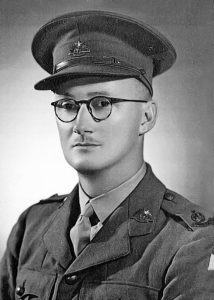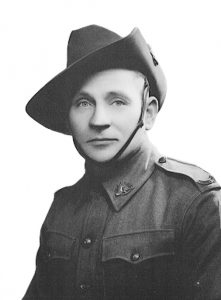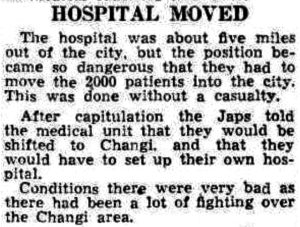Major Charles Edward GREEN WX3435 replaced Commanding Officer, Lt-Colonel WX3376 Michael Joseph ANKETELL who died of wounds 13 Feb 1942.
Major GREEN (below) made it very clear he would not approve of anybody escaping.

In mid March having discussed their plans with WX3452 Capt Tom Bunning, Commanding Offficer ‘B’ Company and received his approval, the two men collected together extra supplies
WX6067 Lt. Penrod Dean and WX12835 Lance Corporal John McGregor from 2/4th Machine Gun Battalion escaped Changi and headed north towards Malaya. Initially they spent time with Chinese freedom fighters, but were recaptured within months and returned to Singapore. At the Singapore Supreme Court, 18 May 1942, the two men were sentenced by a Japanese court to two years incarceration at Outram Road Gaol beginning on 24 April 1942. They were the first two Europeans to face a Japanese military court.
WX12835 John Alexander McGregor

Location: Outram Road Gaol, Singapore July 1943

The following excerpt has been taken from McGregor’s book ‘Blood on the Rising Sun’.
Fifteen months later on 19 Jul 1943, a very ill John McGregor with three Australians and four British POWs were taken out of their solitary confinement cell, unshackled, and miraculously led into a waiting truck. Penrod Dean had managed to brush past McGregor and whispered he was off to Changi Hospital. I say miraculously, because McGregor fully expected to be taken before a firing squad. The Japanese guards only ever played mind games with the prisoners of course in conjunction with being mercilessly belted by guards at any time of the day or night. Now at this moment the Japanese at Outram Road were transferring these POWs out to receive medical treatment – they didn’t want them ‘dying on their watch.’ The men would be closely monitored by the Japanese and returned to complete their sentences.
At Changi the 8 men were dumped on the hot bitumen at Barrack’s Square. Soon after the POWs huddled bodies on the ground were recognised for what they were. Sick POWs requiring urgent medical attention and carried into the hospital by a doctor.
Inside the hospital ward, McGregor cried like a baby at the kindness of the few officers – one offering a rolled cigarette, another offered three boiled lollies. But the well-wishers were soon hunted away when medical staff realised McGregor’s continual muttering about Outram Road, the other prisoners, the conditions, etc confirmed his mental health was precarious. As McGregor wrote ‘he had lost his sense of reason’ believing the Japs were playing a trick on him. The four Australian POWs lay naked, gaunt, filthy dirty with matted hair on their beds, their bodies covered in lice, sores and badly swollen limbs. Remember Outram Road POWs were forbidden to communicate with anybody! The POWs would need time before any further visitors were to be allowed!
A very humbled McGregor had nothing but high praise for the hospital staff and support offered to the POWs at the hospital.
The men were fattened up and McGregor underwent several operations – for haemorrhoids and pterygiums on both eyes were removed in attempt to improve McGregor’s exceedingly low vision. Of course the Kempei Tai doctors were weekly visitors to check the prisoners wellbeing. POWs from Outram Road were not permitted to wander out of their confined area.
McGregor wrote the names of these dedicated doctors: Major Nairn, Major Adrian Farmer of Perth, Major Clarke of Brisbane, Col Bye and Col Cotter-Harvey of Sydney, Lt. Col Glyn White of Melbourne and Major Claffy, Major Orr and Colonel Osborne. And surprisingly, Brigadier ‘Blackjack’ Gallegham, the Australian Camp Commander who was a tower of strength to the Outram Road boys. (I mentioned surprisingly because my research reveals most senior officers on the whole did not visit the sick.)
Outram Road POWs were forever indelibly damaged both physically and mentally.
They all returned to Outram Road to complete their initial sentence.
On his return, McGregor found there had been some sweeping changes –
-
the food was better,
-
sanitation had improved with closed toilets provided in cells,
-
no more solitary confinement!
POWs who were considered sufficiently well enough were offered menial prison duties,
Prisoners were also receiving a daily wash,
daily exercise in the gaol yard,
and corporal punishment as McGregor had previously received was abandoned.
Taking his time to settle back into this new environment McGregor found a place with the fit men in gardening activities in the grounds encircling the gaol.
We don’t know what brought about this change, perhaps change of Outram Road Commanding Officer.
In 1978 John McGregor had the opportunity to meet up with two fellow Australian POWs from Outram Road Gaol – Stanley Davis and Christian ‘Chris’ Henry Neilson of Sydney, he wrote they had not changed – they had with them their indomitable fighting spirit!
‘I’ve said it before, and I’ll say it again – I’m no bloody hero, just one stubborn bugger, that’s all…’ said by Chris Neilson.
Signaller Chris Neilson arrived at Outram Road Gaol mid Oct 1942 and was allocated the adjoining cell to McGregor and soon set about trying to make contact with anybody to communicate with him via morse code. McGregor had only a smattering of knowledge from his chlldhood days, but keen to communicate with his new neighbour, set about learning again. The two prisoners were able to tap away day and night whilst being extra vigilant not to be heard by the guards.

Above: Barrack Square, Selarang with cook house. (with thanks to AWM)
Please read the story of five Australian POWs betrayed by their senior officer
War Crimes trial for Outram Road Gaol Japanese
The books written by John McGregor (Blood on the Rising Sun) and Dean (Singapore Samurai) have several significant variations.
McGregor lost his eyesight and had to learn braille. He published his book in 1980 and had died prior to Penrod Dean writing his book in 1998. McGregor was no longer alive and unable to refute some of Dean’s content.
It was Signaller Chris Neilson who clarified several points, such as Dean did not learn morse code. Only McGregor did.
McGregor never mentioned sabotaging the Japanese, with stolen munitions when they were moving through Malaysia on foot. Surely these actions would have drawn attention – from the Japanese and the locals who would report them. The last thing the men wanted.
_________________
STAFF OF THE 13th AUSTRALIAN GENERAL HOSPITAL
Commanding Officer Col. D.C. Pigdon E.D.
Registrar Major A. R. Home
Lt. Colonels W. A. Bye C. H. Osborn
Majors B. A. Hunt T. P. Crankshaw R. G. Orr
B. W. Nairn J. O. Rosson B. L. Clarke
G. F. S. Davies NX76351
Captains J. L. Frew VX39181 E. B. Drevermann VX61260G F.Braby VX60066 QM
T. G. H. Hogg TX2185 C. R. R. Huxtable M.C. V. A. Conlon VX39982
Adrian Ward Farmer (14 March 1895 – 5 August 1964)
Was an Australian rules footballer who played with University in the Victorian Football League (VFL).
Born in Melbourne to Paul Ward Farmer and Helena Joyce, Farmer was educated at Trinity Grammar School. He later studied medicine at the University of Melbourne. While a first year student, Farmer player a solitary VFL game in the second last round of the 1914 VFL season, scoring two goals as an undermanned University team were defeated by Fitzroy. He also played district cricket for University from 1914 to 1919.
Farmer enlisted to serve in World War I in June 1918 but was never called up and was demobilised in December 1918.
After completing his medical studies Farmer moved to Western Australia and commenced practice in Perth, specialising in ear, nose and throat conditions. He married Jean Saltau on 4 April 1922.
Farmer later served in World War II as Commanding Officer of the 2/4th Casualty Clearing Station in Tampoi, Johor, Malaysia and was taken as a prisoner of war by the Japanese, spending over three years in prison before being released at the end of the war.
Farmer died in Perth on 5 August 1964


Major Bertram W. Nairn

University of Melbourne MB BS (Melb) 1926 FRCS 1934 FRACS 1940
Consultant Surgeon Bertram Nairn was born in Perth, Western Australia in 1901, the son of William Ralph Nairn, a High Court Judge, and Terisa (nee Bertram).
He attended Scotch College and then went to Melbourne to study medicine at Melbourne University. Bertram Nairn spent some time working and studying in England and obtained his FRCS in 1934. He was made a Fellow of the Royal Australian College of Surgeons in 1940.
During the Second World War he served in the Australian Army Medical Corps (13th AGH) as a surgeon with the rank of Major, spending much of his time in Malaya. He was captured by the Japanese and was a prisoner of war at Changi Camp. In recognition of his service he was awarded an MBE (Military). After the war he returned to Perth and established himself in private practice.
In 1946 he was appointed Honorary Surgeon to the Royal Perth Hospital and the Princess Margaret Hospital for Children. He served these hospitals with distinction for twenty years, retiring in 1966. He was at one time Chairman of the State Committee of the Royal Australian College of Surgeons and had the reputation of being a quiet but determined man.
In 1936 Bertram Nairn married Freda Weir and they had three sons, one of whom studied law.
He established a high quality vineyard at the Peel Estate and was a pioneer in this area. The vineyard is now run by one of his sons and produces high quality wines with an international reputation. An active sportsman he rowed for Scots College and played football, tennis and cricket as an undergraduate at Melbourne University. He was a long standing member of the Weld Club. On retirement in 1966, the Board of Management appointed Bertram Nairn Emeritus Consultant Surgeon in recognition of his service to the hospital.
Bertram Nairn died in 1986 aged 85 years.


